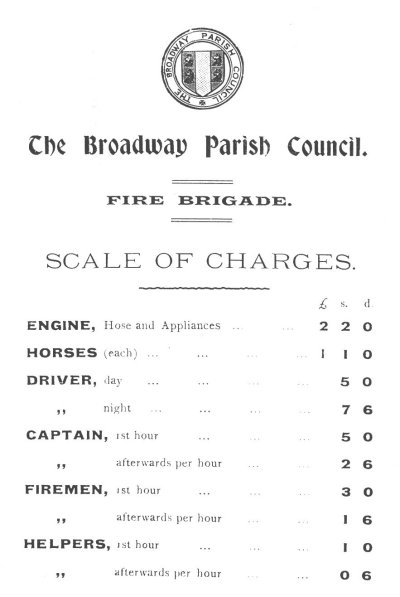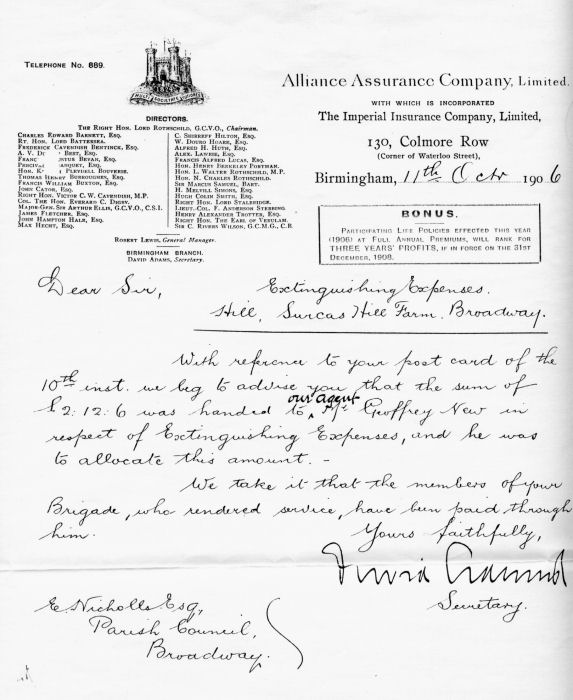| Home . Formation . Equipment . Funding . Local Agreements . Captains . 1897-1933 . Joint Brigade . WW2 . Post War . 1950s . Fires . Gallery | |||||||||||||||||
|
Funding
the Brigade
|
|||||||||||||||||
 |
|||||||||||||||||
|
When
Broadway Parish Council set up their fire brigade in 1897 they received
donations from local people, and from some insurance companies. But
from then on, and for the next thirty-six years, the cost of running
the brigade was borne by the ratepayers of the village, and from fees
charged for use of the brigade. The Council sought advice on what to
charge for their services from established brigades in the area. In
1899 they published a scale of charges, which was similar to that of
the Bromsgrove fire brigade.
|
|||||||||||||||||
|
It
was intended that anyone who received the services of the brigade would
pay in accordance with the scale. This cost was then passed on to the
insurance company, or companies, with whom the property owner was insured.
(Evidently, at that time, it was quite normal to insure a property with
two or more companies). In practice the insurance companies involved,
when settling the bill, would usually deal directly with the Parish
Council rather than the property owner.
Inevitably, there were frequent disputes between the Council, the property owners, and insurance companies as to what fees were due, and who was responsible for their payment. The situation was complicated further because, according to The Local Government Board, the Parish Council was not legally authorised to charge for the services of its brigade either inside or outside the parish. This was pointed out to the Council during an disagreement with the insurance assessors, about the higher than expected fees the Council charged, following the brigade's attendance at a fire at Lower Farm, Aston Somerville in 1903. Broadway Parish Council submitted a bill for more than £20, but the insurance assessors felt it should be nearer £15, and questioned why two firemen were claiming for forty-two hours on duty. They wrote, "...kindly favour us with some explanation as to how this [the long hours] was arrived at". In this case agreement was reached, by the Council agreeing to reduce the fees to around £15, but they then added a further £5 for damaged hose. |
|||||||||||||||||
|
A
similar dispute with the insurers took place when the Parish Council
claimed fees for attending a fire at Mr. Arkell's farm at Cutsdean,
in December 1906. When the Broadway brigade arrived on the scene three
straw ricks had been destroyed, and a fourth was on fire. Due to a good
supply of water, and plenty of help, they prevented the fire spreading
to the remaining ricks. However, in addition to claiming fees for the
captain of the brigade and seven firemen, for eight and half hours on
duty, the Council also claimed for fifty-eight ‘helpers’,
nineteen of whom came from Broadway and had, obviously, followed the
engine for the five miles to Cutsdean. Helpers were, of course, essential
because they were needed to pump the fire engine. But on this occasion,
given the extent of the fire, it is not surprising the insurers questioned
their number, and the length of time they were employed. After much
negotiating it was agreed that the claim be reduced to £20:16s
from the original £25:11:6d.
|
|||||||||||||||||
|
These
were by no means isolated cases. Another argument occurred between the
Parish Council and the insurers, following a fire at George Pope's of
Masty Farm, in August 1923. The Parish Council submitted a bill amounting
to £53:0:6d to The Sun Fire Office for the services of the brigade.
The insurers refused to pay but offered £26:5s (25 guineas), as
they said, "To show appreciation of your service".
They maintained that Mr. Pope, as a rate payer, was entitled to receive
the services of the brigade free of charge. This prompted the Parish
Council to seek the advice of their solicitors, New & Saunders,
who's interpretation of the law agreed with that of the insurers; namely
that charges could only be made by the Council for fires attended outside
the parish. This advice differed from that which the Council had received
from The Local Government Board twenty years earlier in 1903. Their
interpretation of the law had been that the Council was not legally
entitled to charge for services at all, neither inside nor outside their
parish.
|
|||||||||||||||||
|
|
|||||||||||||||||
|
The
issue of who was to pay became even more complicated in the case of
false alarms or fires which had already been extinguished prior to the
arrival of the brigade. In September 1903 Broadway Fire Brigade was
called to Weston Subedge where a rick was reported to be on fire near
the station. The brigade received the call by a telegram, signed by
Mr. Middleton of the company Scott & Middleton who were, at the
time, constructing the railway line from Honeybourne to Cheltenham.
When the brigade arrived on the scene the fire was already out, extinguished
by railway workmen, and the fire engine returned home without the crew
dismounting.
|
|||||||||||||||||
|
Scott
& Middleton later received a bill from Broadway Parish Council which
they, at first, refused to pay on the grounds that it took the brigade
three quarters of an hour to arrive on the scene, and were then not
required. It is quite probable the Rick was not even Scott & Middleton's
property, but that of a nearby farm. The Council pressed for payment,
and warned Mr. Scott, of the company Scott & Middleton, that the
captain of the Broadway brigade had been instructed not to attend any
fires at his farm in Buckland until the money was paid. After much argument
Scott & Middleton eventually agreed to settle the account.
|
|||||||||||||||||
|
Despite occasional legal arguments with the insurance companies, the Parish Council usually received payment for fires their brigade attended. Although, in the case of Mr. Scott it seems it was necessary to resort to blackmail. This unsatisfactory method of funding the fire brigade continued until 1933, when the Broadway brigade came under the control of the Rural District Council. |
|||||||||||||||||
